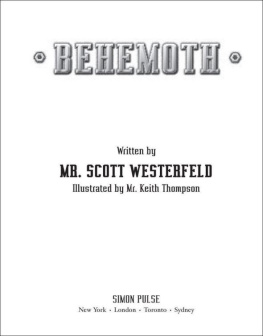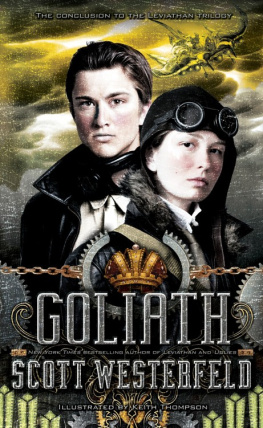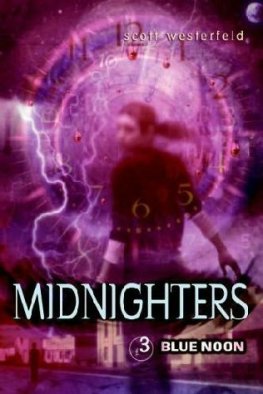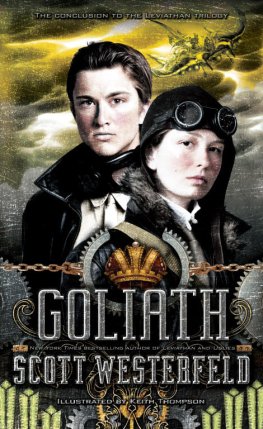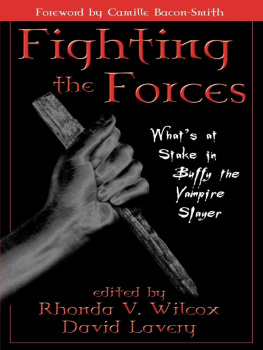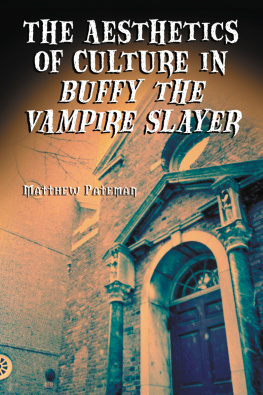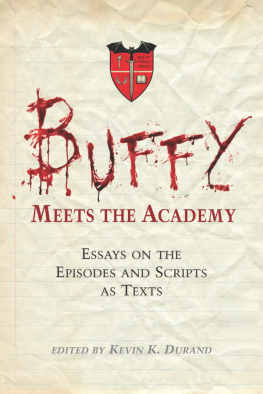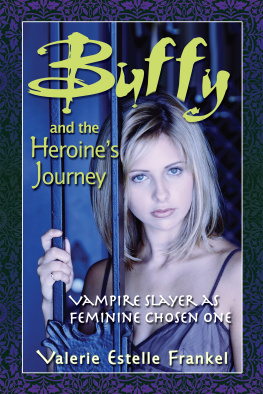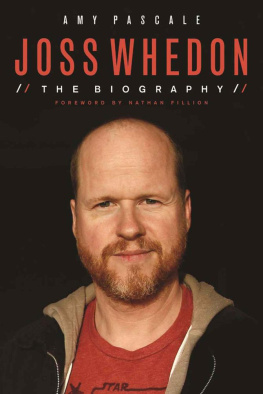Find out more about Seven Seasons of Buffy!
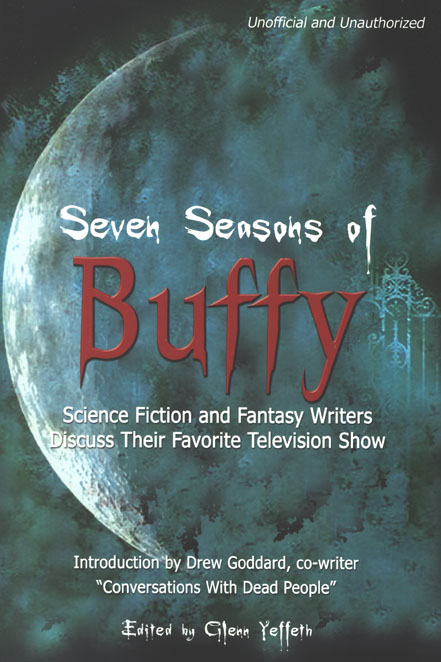
http://www.smartpopbooks.com/book/seven-seasons-of-buffy
Get more of Scott Westerfelds Uglies series with Mind-Rain!

http://www.smartpopbooks.com/book/mind-rain
A Slayer Comes to Town
From Seven Seasons of Buffy: Science Fiction and Fantasy Authors Discuss Their Favorite Television Show
Scott Westerfeld

An Imprint of BenBella Books, Inc.
Dallas, TX
THIS PUBLICATION IS UNOFFICIAL AND UNAUTHORIZED. IT HAS NOT BEEN PREPARED, APPROVED, AUTHORIZED, LICENSED, OR ENDORSED BY ANY ENTITY THAT CREATED OR PRODUCED THE WELL-KNOWN TV SHOW BUFFY THE VAMPIRE SLAYER.
2003 by Scott Westerfeld
All rights reserved.

BenBella Books, Inc.
10300 N. Central Expressway, Suite 400
Dallas, TX 75231
www.benbellabooks.com
www.smartpopbooks.com
Send feedback to
Contents
A Slayer Comes to Town
Scott Westerfeld
reative writing teachers are fond of sweeping generalizations:
Never use adverbs.
Never begin a story with the word the.
Theres only one plot: the shift from innocence to experience.
A friend of mine in Louisiana had a writing teacher who enjoyed proclaiming, The king dies and the queen dies. Thats not a story. The king dies and the queen dies of grief. Now thats a story. Im not sure what thats supposed to mean, nor what any of these sayings are supposed to do for young writers. Probably make all but the most dedicated break down and get a real job.
But recently I heard a good one: There are only two plots: a stranger comes to town and someone goes on a journey. This aphorism helped distill an idea Ive developed over years of reading and writing science fiction and fantasy, resulting in my own sweeping generalization: There are only two kinds of fantastic story: the Alternate World and the Trespass.
What do I mean by this? Allow me to define my terms.
In Alternate World stories, the reader goes on a journey to another era, another planet, a world that follows different rules. Alternative histories, stories of the far future, and tales of elves and magic fall into this category. In their own way, Lord of the Rings, 1984, and Star Wars are all Alternate World stories.
In Trespass stories, a stranger comes to town. Something fantasticwhether The XFiles aliens or Anne Rices vampiresinvades our familiar world of credit cards and disposable razors. Reality is shown to have cracks and fissures we havent seen before.
I must admit, before becoming a Buffyphile I had a deep prejudice against Trespass tales. The techniques that bring Alternate Worlds to life are those that originally drew me to read and write science fiction: the toptobottom world building, the ubiquitous and yet subtle exposition, the filtering of a strange reality through a viewpoint character who finds that reality commonplace. This kind of tale was what I considered to be speculative fiction at its most literary, sophisticated, textured, and, most important, subversive. SF allowed me to visit and create worlds that had completely different rules from our own, and that called everything in our normal world into question.
On the other hand, Trespass stories felt rather more comfortable, designed for readers who prefer to start with something familiar. And there seemed to be a conservative principle at work in most, a tendency for the alien invader to evaporate at the end of the tale. Weve all seen this plot, which I call the Elastic Trespass story:
- 1. Monsters! I cant believe this is happening!
- 2. Its true, there are monsters! Lets kill them.
- 3. Oh, no! When you burned down the house to kill the monsters all the evidence was destroyed. No one will ever believe us now!
In the Elastic Trespass, as in a sitcom, everything goes back to normal at the end of the episode. A return to an unperturbed, normal, daylight world is always effected. E.T. goes home. Its as if theres some sort of natural law at work, a principle of conservation of normality, that makes all the evidence disappear by the storys denouement. Either all marks of the alien are erased by happenstance, or the characters engage in a frantic coverup, apparently unwilling to take credit for saving the world.
(A close cousin to the Elastic Trespass is the Elastic Time Travel story, that old chestnut in which timetravelers wind up on the Titanic and no matter whom they tell about the iceberg all they get is But this ship is unsinkable! and the ship sinks anyway. History had to happen that way.)
The elastic form of the Trespass story is inherently conservative, saying as it does that the stranger who comes to town is fundamentally unknowable. We cant incorporate the alien into our normal world, because that would imply that the world can change. So when the Other pops up, our heroes stomp it into the ground, obliterating all evidence of its passage. Like history, middleclass normality is fixed and unalterable, no matter how many fantastic creatures, ancient curses, and mystical portals might exist in the margins.
This principle is especially strong in stories with young protagonists, partly because no one ever believes kids anyway. Its as if the young adult Elastic Trespass tale is a training ground for adult conformity. Children in these stories always hide E.T. in the closet, repress their own memories, and find themselves unable to break the conspiracy of silence that is the adult world. In C.S. Lewiss Narnia books, at least one of the kids, George, grows up to remember that his trips to Narnia were all a game. He manages to enter adulthood only by repressing the fantasies of childhood. Only they werent fantasies; they were alien realities! (Naturally, hes the one who winds up with the bestpaying job.)
When I watched the first few episodes of Buffy with an uncritical eye, the show seemed destined to be trapped in this mold. The vamps conveniently turned to dust when staked, leaving no evidence. The protagonists were marginalized kids, and their adult mentor a mere highschool librarian (and a bit of a toff), a marginal adult without realworld credibility. Buffy hid her calling from her mother and from the adult world at large. Despite her extraordinary powers, she and her friends (and her viewers) instinctively knew the rules of young adult powerlessness: They wont believe us anyway, and We better leave everything as we found it, or well be in big trouble. Its okay to save the world, but not to change it.
But something about Buffy kept me watching. From the first episode, the show was playing with the conventions of the Elastic Trespass tale, subverting the genre traditions in subtle (and sometimes obvious) ways. In Joss Whedons hands, the elastic of middleclass reality wound up stretching and twisting into new and unexpected forms.
One of the ironclad rituals of the Trespass is the Passage of Disbelief, the moment where the protagonist says, This cant be happening! Now, weve all read and watched a million versions of this scene.
Next page

